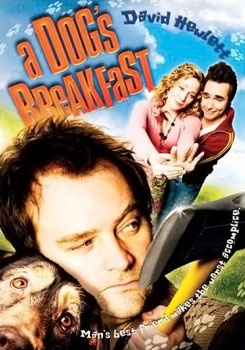
Science fiction first appeared in television programming in the late 1930s, during what is called the Golden Age of Science Fiction. Special effects and other production techniques allow creators to present a living visual image of an imaginary world not limited by the constraints of reality.
Stargate SG-1 is a military science fiction adventure television series within Metro-Goldwyn-Mayer's Stargate franchise. The show, created by Brad Wright and Jonathan Glassner, is based on the 1994 science fiction film Stargate by Dean Devlin and Roland Emmerich. The television series was filmed in and around the city of Vancouver, British Columbia, Canada. The series premiered on Showtime on July 27, 1997, and moved to the Sci Fi Channel on June 7, 2002; the final episode first aired on Sky1 on March 13, 2007.

James Montgomery Doohan was a Canadian actor and author, best known for his role as Montgomery "Scotty" Scott in the television and film series Star Trek. Doohan's characterization of the Scottish chief engineer of the Starship Enterprise has become one of the most recognizable elements in the Star Trek franchise, and inspired many fans to pursue careers in engineering and other technical fields. He also made contributions behind the scenes, such as the initial development of the Klingon and Vulcan languages.

Nelvana Limited is a Canadian animation studio and entertainment company owned by Corus Entertainment. Founded in July 1971 by Michael Hirsh, Patrick Loubert, and Clive A. Smith, it was named after Nelvana of the Northern Lights, the first Canadian national superhero, who was created by Adrian Dingle. The company's production logo is a polar bear looking at Polaris, the North Star.

Amanda Tapping is a British-Canadian actress and director. She is best known for portraying Samantha Carter in the Canadian–American military science fiction television series Stargate SG-1,Stargate Atlantis, and Stargate Universe. She also starred as Helen Magnus in the science fiction-fantasy television series Sanctuary.

CTV Sci-Fi Channel is a Canadian English language discretionary specialty channel owned by Bell Media. The channel primarily broadcasts speculative fiction and related programming.
The history of Canadian animation involves a considerable element of the realities of a country neighbouring the United States and both competitiveness and co-operation across the border.
A strong element in contemporary Canadian culture is rich, diverse, thoughtful and witty science fiction.
U.S. television science fiction is a popular genre of television in the United States that has produced many of the best-known and most popular science fiction shows in the world. Most famous of all, and one of the most influential science-fiction series in history, is the iconic Star Trek and its various spin-off shows, which comprise the Star Trek franchise. Other hugely influential programs have included the 1960s anthology series The Twilight Zone, the internationally successful The X-Files, and a wide variety of television movies and continuing series for more than half a century.

John Colicos was a Canadian actor. He performed on stage and television in the United States and Canada.
The Saturn Award for Best Syndicated/Cable Television Series was presented annually by the Academy of Science Fiction, Fantasy and Horror Films, honoring the best syndicated or cable television series. It was first introduced in 1996 and discontinued in 2015 when the Saturn Awards went through major changes in their television categories.

Paul McGillion is a Scottish actor, who has worked in television, film and theatre. He is best known for his role on the television series Stargate Atlantis as Dr. Carson Beckett.

Stargatefandom is a community of people actively interested in the military science fiction film Stargate and its television shows including Stargate SG-1 (SG1), Stargate Infinity (SGI), Stargate Atlantis (SGA), Stargate Universe (SGU) and their spin offs. The first franchise release, Stargate (1994) spawned four television series successors, four movies, a plethora of merchandise, and a massive franchise collectively known as the Stargate.
Matthew Ray Bennett is a Canadian actor, writer and director. He is best known for portraying Detective Len Harper on Cold Squad and his recurring roles as Aaron Doral cylon model number five in the reimagined Battlestar Galactica and Daniel Rosen in Orphan Black.

Battlestar Galactica (BSG) is an American military science fiction television series, and part of the Battlestar Galactica franchise. The show was developed by Ronald D. Moore and executive produced by Moore and David Eick as a re-imagining of the 1978 Battlestar Galactica television series created by Glen A. Larson. The pilot for the series first aired as a three-hour miniseries in December 2003 on the Sci-Fi Channel, which was then followed by four regular seasons, ending its run on March 20, 2009. The cast includes Edward James Olmos, Mary McDonnell, Katee Sackhoff, Jamie Bamber, James Callis, Tricia Helfer, and Grace Park.

A Dog's Breakfast is a Canadian comedy independent film produced in 2006. It was the first film to be written and directed by British-born Canadian actor David Hewlett, who is best known for his role of Dr. Rodney McKay in the TV franchise Stargate. Hewlett created the film as a private off-season project and stars alongside his real-life sister Kate Hewlett and Stargate actors Paul McGillion, Christopher Judge and Rachel Luttrell. The film was produced by John Lenic and Jane Loughman.

Atmosphere Visual Effects is a Canadian visual effects company. It was founded in Vancouver in 2003 by Andrew Karr, Tom Archer, and Jeremy Hoey, ex-employees of Vancouver-based visual effects company GVFX, after said company folded in that year. They have worked on a number of science fiction shows, including the reimagined Battlestar Galactica, Stargate Atlantis, The 4400, Andromeda, and Babylon 5: The Lost Tales.

Syfy Universal Asia was an Asian cable television channel, launched on July 1, 2008 which mainly airs science fiction, fantasy and horror programs and movies. It also airs anime programming. It is owned by Universal Networks International.











